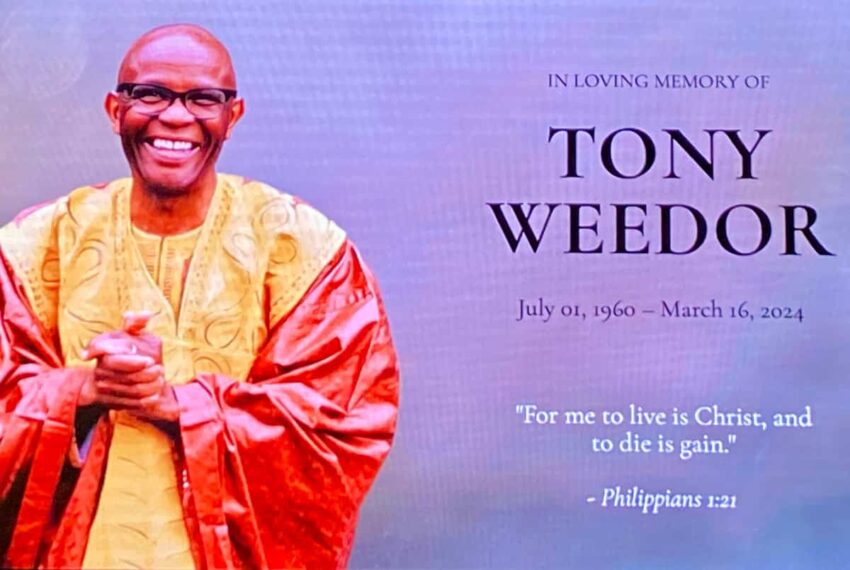Tony Weedor died suddenly on March 16th at age 63. Tony was immigrant and a refugee from Liberia. And he was so much more. I did not know Tony well. I wish I’d known him better. His sudden death while speaking at the small “Family Conference” for the Multination African congregation two weeks ago, was both shocking and mysterious. Shocking for the for the 50-60 who were listening to him speak when he suddenly collapsed. Mysterious, in the sense that witnesses said it was though someone lowered him gently to the floor. Like an angel of God. One moment he was talking about Jesus, the next moment he was with Jesus.
Tony was many things. As it turns out, many more than I knew after attending his “Celebration of Life” service a few days after his death. A large fellowship hall with over 600 people listened for three hours as people from around the globe testified to Tony’s extraordinary life and character. His well-lived life demonstrated love for family, friends, and God. Indeed, his life shown brightly like one of those “stars in the universe” which holds out the word of life (Philippians 2:15-16). More than one of us remarked afterwards that we’d be happy to have a fraction of the impact for people and the kingdom of God as Tony Weedor did.
Tony grew up in a Muslim village in Liberia and was being trained to become the imam of his village. However, an encounter with missionaries in the early 1980’s changed that and he left Islam, choosing to follow Jesus. It was a costly decision and his parents disowned him. In 1989 his country experienced bloody and deadly civil war. Along with his wife and an infant daughter, they endured an arduous journey on foot to the safety of a refugee camp across the Liberian border, barely escaping with their lives. After four years in a refugee camp they immigrated to America where they earned degrees from Denver Theological Seminary. Eventually Tony ended up in Louisville on the Mission’s Ministry staff at Southeast Christian Church. This is where I met him last year in my quest to understand the immigrant church landscape in Louisville.
It was said that Tony had a passion for God, passion for the truth, passion for culture, and compassion for people. These passions were all guided and informed by his deep knowledge and application of the Word of God, his compass for what all that is true and good. He was a respected theologian and pastor. He and his wife, Beth, continued to love the people of the country of origin, Liberia, and a robust gospel ministries meeting people’s physical and spiritual needs through a radio broadcast and Beth’s non-profit Petals of Hope.
I was fortunate to get some one-on-one time with Tony on two occasions in the past few months. I was greatly interested in his perspective as an African theologian working at our white, mono-cultural megachurch. I barely scratched the surface of what I wanted to learn from him. I’ll have to be satisfied with being inspired to live more fully, freely, and joyfully as a redeemed child of God in Jesus. However, here are a few observations and things I learned in our meetings and observing him in other settings. First, he loved to recommend books to help people grow spiritually and intellectually. In my case, he even gave me a book cross-cultural leadership he thought would be helpful to me in my doctoral research. He was especially intentional to point out and recommend African theologians, like Kenyan, John Mbiti, and their important contributions to the kingdom by elevating African voices to the global missiological conversation.
It was clear that Tony possessed a wonderful sense of humor along with a keen intellect. Together with his very kind and approachable demeanor, he brought a refreshing and needed outsider, African perspective from the global church to our white-American middle class mega-congregation. In my conversations with Tony, he was enthusiastically reformed in his theological perspective and was quite fond of quoting a wide range of influential, dead theologians from around the world. He signed his emails, “Soli Deo Gloria”. He told me he loved being at Southeast and working on staff for the past four years. Moreover, in spite of many cultural differences, he noted that he had never personally experienced prejudice or racism, only love, respect, and kindness. He also observed and appreciated how the African Multination leaders were treated with equity and respect, just like their counterparts at any other SE campus.
Tony shared with me that he was excited and hopeful for the potential of my research project examining the ministry relationship between Southeast and Multination. He was convinced that many mutual benefits and blessings will result from Southeast’s willingness to venture out of their comfort zone and embrace an immigrant congregation like Multination. I believe him to be prophetic in this conviction, owing in no small part to his own voice and influence over the past four years.
I did speak to him on the last day of his life on earth. I was at that family conference but left 30 minutes before someone sent me a text that Tony had collapsed and died. I arrived on time for the conference earlier that day, knowing that one of Tony’s many African aphorisms would be true. “Americans have watches, Africans have time.” And sure enough, only a few of the conference leaders and speakers were there at the 11am starting time. The rest of the Africans would arrive 30-60 minutes later. And so I had a chance to chat with Tony and others that morning. Not knowing it would be the last time.
His autobiography is titled, “The Reason for Tears.” Now he’s in a place where there are no more tears, or suffering, or death. On March 16, 2024, while teaching about the kingdom of God, “in a flash, in the twinkling of an eye” he was changed, and he exchanged his mortal body for a glorious immortal one, and was surely welcomed with the words, “Well done, good and faithful servant.” But as one dear sister noted during the Sunday service the next day, “though we do not grieve as those who have no hope, we still grieve.”

